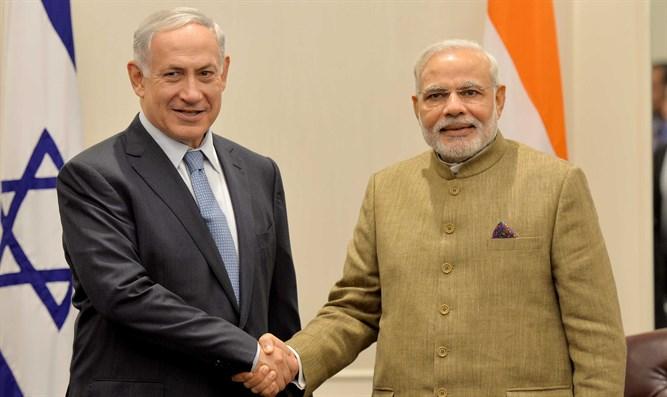Making Militarism Profitable: How Israel is Aiding Booming Military-Industrial Complex in India

The Stockholm International Peace Research Institute, in its 2018 factsheet, revealed that India is the biggest importer of weapons in the world. The same factsheet shows that it buys 50% of Israel’s weapons exports. These numbers reflect an alarming trend towards militarisation in India. The scale of arms imports from Israel is linked to the flourishing ties between the two states whereby India adopts more and more the ideological paradigms and repressive methods of the Israeli apartheid state and abandons the Palestinian cause.
Further, the growing military ties with Israel are giving a firm push to a corporate-driven military industrial complex in India, a framework within which kickbacks and corruption scandals are rampant and unsurprising. Right from its early days, this cooperation has been fraught with serious issues. The Barak missile scandal, which saw corruption charges involving high-ranking BJP ministers, had led to a Central Bureau Investigation (CBI) enquiry. The enquiry exonerated the key players but had put Israeli Aerospace Agency and Rafael, both Israeli state-owned defence companies, on a restricted list during the course of the investigation. Since then, the volume of trade with Israeli defence agencies has multiplied. And it is not based on pure economic interests.
Militarism Built on Ideological Proximity
While the Congress-led United Progressive Alliance (UPA) also carried forward the growing defence ties with Israel, the current BJP-led National Democratic Alliance (NDA) has made it abundantly clear that it is not only Israel’s weapon systems that the government seeks to import, but also the accompanying ideology and methodology of repression.
In a shocking instance of police militarisation, protesters were fatally shot by the police in Thoothukudi (Tamil Nadu) in an anti-Sterlite agitation in May this year. Rumours of the cop who shot at the protesters being trained in Israel led us to discover a high-level police training cooperation agreement between India and Israel. As a part of this cooperation, Indian police trainees are sent to Israel to learn their methods of controlling and surveilling Palestinians. A majority of arms imported from Israel are designed for crowd management, surveillance and counter-insurgency.
For Israel, India is the most crucial buyer of its defence systems. India buys 50% Israel’s arms exports. The key peg for Israel while selling these weapons is that they are ‘field-tested’ i.e. they have used to kill or maim Palestinians.
Admiration for the Israeli military ideology pervades the establishment. In a piece that was published earlier this year, a former director of the Defence Research and Development Organization (DRDO) went all out to draw parallels between the Hindutva of Golwalkar (Rashtriya Swayamsevak Sangh ideologue) and the Zionism of David Ben-Gurion, adding further that “Prime Minister Narendra Modi’s visit to Israel in 2017 and visit by the Israeli Prime Minister Benjamin Netanyahu to India this year, have catapulted the strategic ties between the two countries beyond the ideological template of nationalism of Savarkar.”
Curiously, a former director of the DRDO argued that the public sector defence ndertaking’s poor performance should be overcome by building strategic partnership with Israel. More recently, the Chief of Army Staff, General Bipin Rawat, invoked Israel’s use of armed drones in making a case for such deployment in Kashmir, only ruing that the Indian civil society would accept the ‘mistakes’ made in the process and complain about collateral damage. That the Indian state draws inspiration from Israel in crushing the resistance in Kashmir is now common knowledge.
Making Militarism Profitable
There is another dimension to India’s growing militarism where again Israel is a key player. India’s defence sector has predominantly been a public sector enterprise. According to science and defence expert D Raghunanadan, “Small and medium private enterprises have long been providing ancillary services to defence PSUs”. That picture is geared towards a change now. With the opening up of foreign direct investments in the defence sector, major private players are now making forays into the field.
Starting with the Kalyani Rafael Advanced Systems facility in Hyderabad, which commissioned production of anti-tank guided Missile systems this year, we are witnessing a growing military-industrial complex. Here again, Israel has entered many key joint ventures and as discernible from thislist, they are geared towards surveillance, short-range targets, drones, etc. Many of these deals have happened post-2014, coinciding with the Bharatiya Janata Party (BJP) coming to power. For some major corporations, such as Adani Defence, this is the first experience in the field of defence manufacturing.
Two points need to be stated clearly here. First, a burgeoning private military industrial complex dramatically alters policy-level priorities. Even without this aspect, India is spending a dangerously large amount on arms. But when production of weapons becomes profit-oriented, it fosters unending conflict simply to justify and continue that profit-making through weapons and war. This very logic has been used by the United States for its incursions and war-mongering in Afghanistan, Iraq, and now Syria.
Evidently, in such a scenario, respect for human rights and human lives endangered through conflict become worthless for those reaping benefits. Recently, this has been highlighted in the case of Israel, which armed genocides from Rwanda to Myanmar. Seventy per cent of Israel’s defence production is for exports, sustaining wars and using those profits to sustain its military occupation over Palestine.
The fact that the key driver in this steadily growing military-industrial complex in India is Israel should be cause of serious concern for our civil society.
This closely relates to the second important point. Any manner of profiteering from military relations with Israel is quite simply profits made out of Israel’s illegal occupation and colonisation of Palestine. Just in this year, Israeli forces have killed over 200 unarmed protesters in Gaza demanding their right to return to their homes. Each arms deal, each defence joint venture finances this repression and massacre.
Divesting from Israeli defence companies is, therefore, a necessary condition for protection of Palestinian human rights. Simultaneously, police repression of civilian resistance and deployment of the army, and encouraging its impunity, where a political solution is needed has been the default modus operandi for the Indian state. Defending human rights in India urgently requires resisting militarism and the burgeoning corporate profiteering from it. In this sense, the defence of human rights in Palestine and in India is linked.
Since 2005, the Palestinian-led Boycott, Divestment and Sanctions (BDS) movement has given the call for military embargo on Israel. Global solidarity for the Palestinian freedom struggle is increasingly taking the shape of BDS campaigns and military embargo is a key demand within it which is finding resonance with solidarity groups. Moreover, the interlinkages between repressive regimes around the world and their military ties with Israel are being exposed by activists.
In Latin America, BDS groups have done a detailed study on how military relations with Israel have directly supported militarisation and human rights violations and coups in their region and are campaigning to stop these relations. We, in India, need similar efforts in India to expose these dynamics. Time is ripe for us to stand together and stop these relations as a necessary – but not sufficient – step to protect human rights in Palestine and South Asia.
(The writer is the South Asia Coordinator for Palestinian Boycott, Divestment and Sanctions (BDS) National Committee)
Get the latest reports & analysis with people's perspective on Protests, movements & deep analytical videos, discussions of the current affairs in your Telegram app. Subscribe to NewsClick's Telegram channel & get Real-Time updates on stories, as they get published on our website.






















